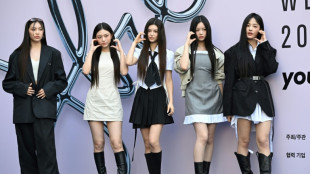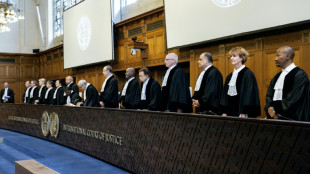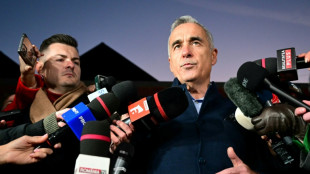
-
 Crypto boss eats banana art he bought for $6.2 million
Crypto boss eats banana art he bought for $6.2 million
-
Teen news boss criticises Australian social media ban

-
 Taiwan detects 41 Chinese military aircraft, ships ahead of Lai US stopover
Taiwan detects 41 Chinese military aircraft, ships ahead of Lai US stopover
-
Spain urged to 'build differently' after deadly floods

-
 WTO chief faces heavy task as Trump threat looms
WTO chief faces heavy task as Trump threat looms
-
Herbert takes control at Australian Open as Smith tanks

-
 Israel PM again warns Iran after top diplomat talks of revising nuclear doctrine
Israel PM again warns Iran after top diplomat talks of revising nuclear doctrine
-
Brilliant Brook's 132 puts England on top against sloppy New Zealand

-
 Brilliant Brook's 132 puts England on top against New Zealand
Brilliant Brook's 132 puts England on top against New Zealand
-
US landmine offer to Ukraine throws global treaty into 'crisis': campaign group

-
 Singapore hangs 4th person in three weeks
Singapore hangs 4th person in three weeks
-
Five things to know about NewJeans' shock split from agency

-
 Waste pickers battle for recognition at plastic treaty talks
Waste pickers battle for recognition at plastic treaty talks
-
Ireland votes in closely fought general election

-
 Top UN court to open unprecedented climate hearings
Top UN court to open unprecedented climate hearings
-
European countries that allow assisted dying

-
 British MPs to debate contentious assisted dying law
British MPs to debate contentious assisted dying law
-
Schmidt not expecting hero's welcome on Ireland return

-
 PSG stuck between domestic dominance and Champions League woes
PSG stuck between domestic dominance and Champions League woes
-
'Hot fight' as unbeaten Bayern visit Dortmund fortress

-
 Bordeaux-Begles' Samu 'not finished yet' with Wallabies
Bordeaux-Begles' Samu 'not finished yet' with Wallabies
-
Brook and Pope half-centuries haul England to 174-4 against NZ

-
 Yen rallies on rate hike bets as equity markets swing
Yen rallies on rate hike bets as equity markets swing
-
Ukraine superstar Mahuchikh brings 'good vibes' to her war-torn country

-
 PlayStation at 30: How Sony's grey box conquered gaming
PlayStation at 30: How Sony's grey box conquered gaming
-
Saudi Arabia hosts UN talks on drought, desertification

-
 PlayStation: Fun facts to know as Sony's console turns 30
PlayStation: Fun facts to know as Sony's console turns 30
-
Nepal's first transgender candidates run for local office

-
 Father of PlayStation says 'everyone told us we would fail'
Father of PlayStation says 'everyone told us we would fail'
-
Ireland seek to overcome former coach Schmidt's Wallabies

-
 Detroit survive Bears comeback to make it 10 wins in a row
Detroit survive Bears comeback to make it 10 wins in a row
-
Mexican actor Silvia Pinal dead at 93

-
 'Black Friday' deals target inflation-weary US consumers
'Black Friday' deals target inflation-weary US consumers
-
Liverpool look to deepen Man City crisis, Amorim seeks first Premier League win

-
 Police fire rubber bullets, tear gas at Georgia protesters after PM delays EU bid
Police fire rubber bullets, tear gas at Georgia protesters after PM delays EU bid
-
England lose three quick wickets in reply to New Zealand's 348

-
 Social media companies slam Australia's under-16 ban
Social media companies slam Australia's under-16 ban
-
Police fire tear gas at Georgia protesters after PM delays EU bid

-
 Canada watchdog sues Google over 'anti-competitive' ad tech
Canada watchdog sues Google over 'anti-competitive' ad tech
-
Hojlund gives Amorim winning Old Trafford bow, Roma hold Spurs

-
 Amorim wins first Man Utd home game after rollercoaster ride
Amorim wins first Man Utd home game after rollercoaster ride
-
France arrests 26 as South Asian migrant trafficking ring smashed

-
 At least 15 dead, 113 missing, in Uganda landslides
At least 15 dead, 113 missing, in Uganda landslides
-
Netanyahu threatens 'intensive war' if Hezbollah breaches fragile truce

-
 Bilbao join Lazio at Europa League summit, Chelsea cruise in Conference League
Bilbao join Lazio at Europa League summit, Chelsea cruise in Conference League
-
In Lebanon's Tyre returning residents find no water, little power

-
 Protests in Georgia after PM delays EU bid to 2028
Protests in Georgia after PM delays EU bid to 2028
-
Biden slams Trump tariff threats as 'counterproductive'

-
 TikTok tactics shake up politics in Romania
TikTok tactics shake up politics in Romania
-
'He should do comedy' says Norris of Verstappen comments


Netflix, UNESCO seek breakthrough for African cinema
It's a revenge thriller where a mother turns into a ruthless vigilante, tracking down and drowning a soldier who has killed her baby, in an explosion of violence and jubilation.
What might sound like the plot of the latest flick by Quentin Tarantino or another Hollywood auteur is actually the fruit of a partnership between streaming giant Netflix and the UN cultural agency UNESCO to give a platform to new voices in African cinema.
"Katera of the Punishment Island", directed by Ugandan Loukman Ali, is among six short films co-financed on the continent by the American platform and the UN agency.
"It's the revenge of a young girl, left to her own devices and yet who is going to smash up everything," said French producer Pape Boye, who served as a "mentor" to the director and praises the "jubilant violence" of the film.
Loukman Ali, he said, is a worthy representative of a new generation of African filmmakers, who grew up on a diet of mainstream cinema and "want to be seen by as many people as possible", scorning so-called genre films.
The director, 32, said he embraced cinema as a form of escapism and a way to forget the poverty surrounding him as he was growing up.
"Each time there was a film that reminded us of how poor we were or how bad situation the situation was, it was kind of like a no-no," he told AFP in a telephone interview. "I am more about entertainment. That's the model I follow."
- 'Stories I wanted to tell' -
Loukman Ali was chosen by the scheme last year, among 2,000 pitches received by UNESCO and Netflix, to direct his short film, with funding of some $75,000 dollars. "Katera of the Punishment Island" has been available since Wednesday on the platform.
Five other young African filmmakers have also enjoyed this privilege, including the Kenyan Voline Ogutu, whose "Anyango and the Ogre" is set in a futuristic world where women are divided into two categories, single or married -- with the latter group exposed to domestic violence.
"I always wanted to tell stories of horror and sci-fi. But the market I was in was not very accommodating," she said.
"This is a very good opportunity for me to actually now tell the stories I wanted to tell."
Decision makers can be bolder elsewhere, such as in South Africa, from where several daring series have recently emerged, and especially in Nigeria's so-called Nollywood, where 2,500 films are released each year, often at low cost.
But Steven Markovitz, the executive producer of the joint Netflix and UNESCO project, said dozens of young emerging African directors were challenging ideas of a "traditional" African film.
He said that in the 1970s and 80s, slower-paced African films on sober subjects were dominant.
"But if you look at a lot of filmmakers today, they're much more playful and provocative, they're more open to trying new forms, they try to build bigger audiences, wider audiences for their work."
He said that this change had been notable for some time but was now accelerating at pace partly due to new technology but also due to the fact today's Africans may be the third or fourth generation since the colonial era.
"They are more about asserting their identity in the present and the future. There's a philosophical shift amongst this generation, and that's why they're a lot more free in their thinking in the telling."
- 'Leap of faith' -
Tendeka Matatu, of Netflix Africa, said that there was now even a "golden age" of African filmmaking.
"The Africa of the 1970s is very different from the Africa of the 2020s," he said. "The filmmakers want to tell stories that reflect the society of this year."
Streaming platforms are playing a crucial role, investing heavily in a chronically underfunded and underequipped film industry on a continent where, according to UNESCO, around 40 percent of the countries do not have a single cinema.
Within eight years, the size of the African streaming market, today estimated at 3 million subscribers, will increase by sixfold, according to UNESCO's deputy director general Ernesto Ottone.
But this remains a modest figure compared to the 1.7 billion Africans, because hundreds of millions still have neither a sufficiently good internet connection nor the means to subscribe to a platform.
But filmmaker Leila Djansi of Ghana, the mentor for "Anyango and the Ogre" said the main problem is that African cinema is above all lacking acceptance.
"I agree it's a business. You are putting in millions. But give people a chance. Take a leap of faith.
"Poverty, HIV, war... there's more to Africa than that, but until African filmmakers are given the opportunity to tell these stories, the perception is always going to be negative," she said.
O.Lorenz--BTB
